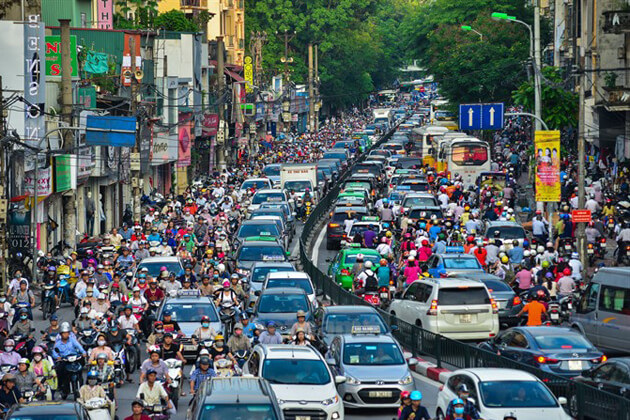
Why Are Vietnamese People So Loud? Exploring Cultural Differences and Misunderstandings
One of the first things many visitors notice when they arrive in Vietnam is the noise. The constant honking of motorbikes, the lively chatter in the streets, and the general hustle and bustle can feel overwhelming, especially for those new to the country. A common observation is that Vietnamese people seem loud in their everyday interactions. But is this perception really accurate, or is it simply a misunderstanding caused by differences in culture? In this article, we’ll dive into the reasons behind this, exploring Vietnam’s social norms, history, and everyday life.
Everyday Life in Vietnam: A Noisy Affair
Before we jump into cultural explanations, it’s important to understand the environment in which Vietnamese people live. Vietnam is a densely populated country, especially in big cities like Ho Chi Minh City and Hanoi. Here, millions of people live close together, and the streets are always buzzing with life. In these crowded places, the concept of “personal space” is different from what you might find in quieter countries. Vietnamese people are used to being surrounded by noise, whether it’s the sounds of traffic or conversations happening all around them.
Historically, Vietnam has always had a strong sense of community. People often live with their extended families, and neighbours are in constant contact with each other. This closeness means that private conversations often happen in public spaces, and loud interactions are just part of the daily routine. For Vietnamese people, noise is not something to avoid—it’s a normal part of life that signals activity and togetherness.
Read more: 6 Street-Smart Secrets: How to Safely Cross the Road in Vietnam

Roads in Vietnam are extremely busy – especially in larger cities
The Role of Markets and Street Life
Vietnam’s vibrant street culture plays a big part in why the country can seem so loud to outsiders. In bustling markets, street vendors need to shout to grab people’s attention. Whether they’re selling fresh fruit or clothing, they must stand out in the crowd. Loud haggling and calling out to potential customers is just how business is done. What might seem overwhelming or chaotic to a visitor is simply a normal part of life for those who live here.
These street markets aren’t just places to buy goods—they’re social hubs where people chat, bargain, and joke with one another. The loudness in these markets is not seen as rude but rather as part of the fun. In fact, it’s a reflection of Vietnam’s long-standing tradition of community engagement. Talking loudly, laughing, and even arguing in public is just part of the lively market atmosphere, something that has been around for centuries.

Markets in Vietnam are an essential part of the community and, as a result, are loud and busy
Children in Restaurants and Public Spaces
A similar observation can be made in restaurants and other public spaces where children are present. It’s not uncommon to see children running around, playing loudly, or even screaming while dining out. For many visitors, this might seem disruptive, but in Vietnam, it’s generally accepted as normal behaviour. Children are often given the freedom to move around and express themselves energetically in social settings, without the expectation of staying quietly seated as is more common in Western cultures. This approach reflects the broader social acceptance of noise in Vietnamese daily life and the strong importance of the needs of the younger generation taking precedence.

Children are often allowed to run and scream in public places, which can seem disruptive to expatriates and visitors
The Vietnamese Language: A Contributing Factor to Perceived Loudness?
The structure of the Vietnamese language itself may also play a part in why the speech can seem louder. Vietnamese is a tonal language, meaning the pitch or tone used when saying a word can completely change its meaning. Because of this, people need to speak clearly and use varied intonation, especially in noisy settings. If someone doesn’t hear the correct tone, the meaning of a word could be misunderstood.
In addition, Vietnamese has a fast-paced, rhythmic flow. Conversations often move quickly, and it’s common for people to talk over one another in casual settings. This can give the impression of urgency or loudness, but for native speakers, it’s just a natural part of how they communicate.
Misunderstandings and Cultural Perception
It’s important to recognize that the perception of Vietnamese people as being loud might come down to cultural differences more than anything else. Visitors from quieter countries often expect public behaviour to be more reserved. In Vietnam, what is perceived as “loud” in one culture might simply be considered normal, friendly interaction.
The idea that Vietnamese people are loud is a common observation made by visitors, but it’s important to look at the cultural context behind this perception. Vietnam is a vibrant, densely populated country where the streets are alive with activity. Noise isn’t something to be avoided—it’s part of the rich social fabric of daily life.
Overall, rather than seeing loudness as something negative, it can be appreciated as a sign of energy, community, and emotional expression. Understanding the reasons behind this perception can help outsiders better appreciate the dynamic and lively nature of Vietnamese society, where communication and connection are valued above all else.







